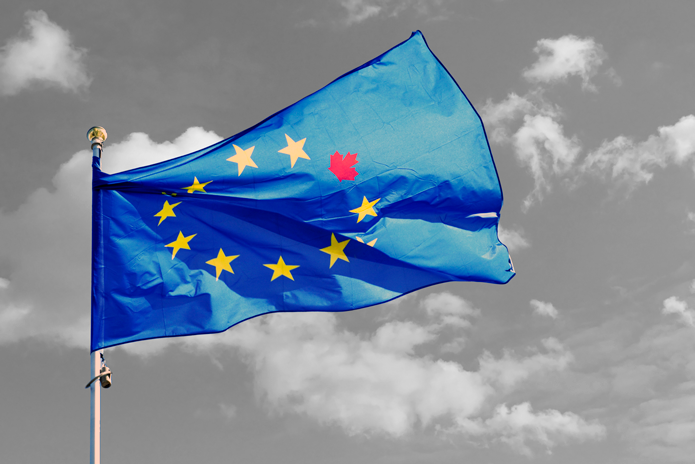May 15, 2017
Canadians have always aspired to a kind of open, cosmopolitan citizenship. Wilfrid Laurier said freedom was our nationality. Pierre Trudeau declared himself a citizen of the world.
We were very much at home in the world of the last 70 years, a world defined partly (and inconsistently) by new kinds of openness: global governance, freer trade and the unprecedented movement of people. In 2017, that world is no longer a certainty. We are witnessing a return to thicker borders and trade skepticism. This is very possibly a passing fad, driven by fear, economic anxiety or perverse nostalgia. Or, it could also be something worse. Regardless, there is no future for Canada in a retreat inward.
The EU may be the greatest multilateral achievement of the post-war era. The stability it delivered was so quietly reliable that it became easy to overlook. Unfortunately, that’s precisely what has happened. Today, the EU is not exactly synonymous with stable international cooperation. But let’s explore the possibility and examine the potential impacts of Canada joining the EU. Democratic institutions, rule of law, human rights and minority protections, functioning market economies and the capacity to cope with market forces in the EU. No challenges from that perspective.

The EU is a comfortable fit in other respects as well. Canada is one of the oldest federations in the world and it has been suggested that the spirit of federalism sits at the very core of our nationhood and citizenship. We would bring cultural and technical familiarity with multi-level governance to the union in a way few other countries could. Unlike the Brexiteers, we understand that our sovereignty is not imperilled when we choose to make decisions collectively. We are free to pool our sovereignty with that of other peoples in the pursuit of shared goals.
What do we have to gain? Most importantly, Canada can begin to share in Europe’s “four freedoms”: free movement of goods, services, capital and people. The Comprehensive Economic and Trade Agreement (CETA) was an enormous step toward economic integration with Europe. But it is important to understand that even with CETA, we will still not enjoy the benefits that EU members do.
Having free trade with Europe is different from belonging to the European common market. CETA leaves some tariffs intact. It is limited in the degree to which services are liberalized. And of course, free movement of people remains well beyond the limits of CETA. That would be the transformative change – an opportunity for Canadians to live, work and study throughout the Union and for Canada to bring aboard the new talent and fresh perspectives of other EU nationals. It would create a stream of low-skilled immigration alongside our points-based immigration system and this could theoretically test our traditionally high levels of support for immigration. But the reciprocity inherent in joining – the new mobility freedom and economic benefits Canadians would also enjoy – helps make the case.
There is no future for Canada in a retreat inward.
The modest labour mobility measures provided in CETA are already regarded as perhaps the most important elements in the agreement for fostering economic growth. Canadian companies have complained about administrative obstacles in deploying workers to Europe and have suggested that improved labour mobility would more fully unlock the benefits of trade liberalization. CETA negotiators from Quebec pushed hard for labour mobility, on the basis of their experiences with a bilateral Quebec-France agreement for mutual credentials recognition.
Membership in the EU would go much further. And young Canadians would benefit, for example, from full access to the feted Erasmus programme, which promotes pan-European mobility in education and training. Given that trade between EU member states is freer than trade between Canadian provinces, joining the common market might even (bizarrely) force us to finally achieve a national economic union here at home.
We would also advance our interests by doing major service to the project of international stability. Canada’s accession would be a coup for the EU at a time when wins are badly needed. We would be no bit player as the sixth-largest member by population (post-Brexit) and the fourth-largest economy, with a strong and positive international reputation. We would easily have enough heft to act as a reform agent.
Canada’s membership would also change the meaning of the EU in a fundamental way. The Union has struggled to cultivate a strong, broad sense of shared European identity. It is often suggested that this is part of the reason for its legitimacy crisis among various European publics.
Perhaps, with the addition of Canada, a new and more effective narrative could be constructed for the EU – not as a superordinate European community to supplant individual European nationalities but, rather, as the premier global marketplace and most essential guarantor for freedom and democracy. At a moment when the leadership of the free world is hard to locate, the EU has a critical role to play globally. But its capacity to do so is reduced by internal weakness and a lost sense of purpose. Canada could reverse this momentum and it is in our interests to do so.
So, should we waste no further time and prepare our application for accession? Well no, probably not. There are other considerations.
Feasibility is one. In continental unions, as in real estate, it’s: location, location, location. Canada is not in Europe and precedent suggests that this matters. Morocco applied for membership in the European Communities (an EU forerunner) in 1987 and its application was denied on the grounds that it was not a European nation. True, Cyprus is a full member and Iceland has applied in past. Both are modest geographic stretches (and further from one another than St. John’s is from Brussels). But still. Canada is – unambiguously – not in Europe.
By the same token, joining the Eurozone holds little appeal. Prospective new applicants for EU membership have received pressure to adopt the Euro as their national currency. If we did so, we would sacrifice control of our currency and lose a major lever in fiscal policy. We would receive fewer of the associated benefits than members on the continent who are inevitably more economically integrated with one another.

Joining the EU could also limit our capacity for openness with other parts of the world. We do not want to become a European nation at the expense of realizing ourselves as an Asian one, for example. But as a member state of the EU, we would not be free to pursue free trade with Pacific nations ourselves. Theoretically, EU membership could impact NAFTA as well.
And yes, this could all be a case of trying-too-hard contrarianism. The future of the EU is very much in question. Recent elections have been encouraging, but political change could still transform Europe into a much less appealing partner in the coming years, if the Union survives at all. This crisis provides part of the impetus for Canada to lend its support but it is also (of course) a heavy disincentive to entering protracted discussions with a possibly evanescent negotiating partner.
The drawbacks from full membership in the EU, in sum, are that we probably can’t join and we probably shouldn’t. Fortunately, there are other models to consider. Europe is a series of concentric circles. 28 nations belong to the European Union. 26 belong to the Schengen Area, where passport-free travel across borders is permitted. 19 participate in the Eurozone and share the single currency. The European Economic Area includes some nations that are not EU members, as does the European Free Trade Association and the Customs Union which includes Turkey.
Norway, Iceland and Lichtenstein are not EU members and do not use the Euro. But they contribute to the budget of the EU, have access to the common market and participate in the free movement of people. Some EU laws are applicable and others are not. Switzerland has a similar, more limited arrangement, managed through a number of bilateral treaties which enable access to the common market and quasi-open borders but stop well short of full participation in the EU. Several economists in the UK have argued that a Norway-type arrangement to follow Brexit is most appealing, in the sense that it could minimize damage to the British economy.
Neither of these arrangements could be applied wholesale to Canada. But do they offer some direction? Could Canada pursue negotiations for a sui generis arrangement, which would permit Canadian participation in the four freedoms, in exchange for a budgetary contribution and limited participation in EU institutions? This kind of arrangement could deliver most of the key benefits of integration with Europe and limit the liabilities. It would still be a game-changing proposal from both the Canadian and European perspectives. How Europe would respond is difficult to predict.
There is no need to stop there. This could be just the first step in a Canadian strategy for incremental progress towards open borders. There are other proposals under contemplation, which aim to enhance free movement for Canadians in other parts of the world. We should think bigger and broader.
Ultimately, making Canadians the freest people in the world seems a worthy goal for Canada 150. That means bringing down borders, which is something that – despite recent setbacks – the EU has achieved better than anyone else. So let’s join the EU (sort of).

As Canada marks its 150th birthday this year, Canadians have a historic opportunity not only to celebrate a century and a half of accomplishments, but also to look forward to what we can achieve in the future. The Mowat Centre is releasing a series of short written pieces and video interviews in the weeks leading up to July 1st that will look ahead and present a variety of bold, potentially transformative policy ideas.
More Bold IdeasAuthor
Mike Morden








